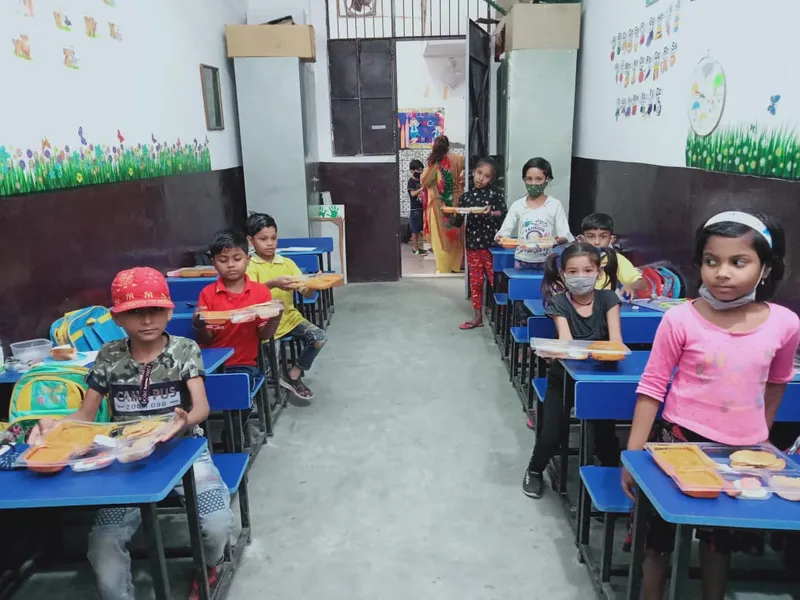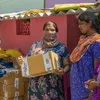This Gurugram-based mobile kitchen provides free meals to the poor during COVID-19 pandemic
Rasoi On Wheels is a mobile kitchen service, which provides ‘ghar jaisa khana’ to the underserved communities in Gurugram in hygienically packed boxes.
According to a study, about 14 percent of the Indian population is undernourished. The Global Hunger Index highlights that India is at the 94th position out of 107 countries, labelled as a ‘serious’ level of hunger.
To this effect, many organisations are taking steps to ensure no food is wasted and distributed to the poor who sleep with a hungry stomach. While the kindness and thoughtfulness of this cannot be priced, it doesn’t always assure that the meals are nutritious and healthy enough for consumption.
Gurugram resident Atul Kapur believes these people should not be deprived of nutritious food just because they cannot afford it. So he, along with Manika Badhwar and her husband Ashim Badhwar, founded .

Rasoi on Wheels distributes food to schools as a part of the mid-day meal programmes
The NGO provides freshly cooked, nutritious, and as their tagline reads, ‘ghar jaisa khana’ to the underserved communities in and around Delhi and Gurugram.
Rasoi On Wheels started by feeding a small number of people but began growing exponentially four years ago.
Free and fresh meals
“We feed about 2,000-2,500 people with fresh food prepared in our centralised kitchens. We distribute this food to pre-determined places, including outside hospitals, slums, and government schools (mid-day meals for children), among other places,” Atul says.
The kitchen — which opens at 4 am — has employed eight to nine individuals who prepare the food. It starts distribution at around 9 am and can easily serve about 2000-3000 people per day.
Atul says he often gets requests from restaurants to distribute the leftover food of the day. However, since its freshness cannot be determined, it chooses not to distribute it. Instead, it prepares fresh meals for the underserved.

Meals being packed for distribution during the pandemic.
The NGO receives funds mainly through individual donations. While some companies have tied up as part of their CSR initiatives, Atul says it also has ISR (Individual Social Responsibility) funds as well.
“People can donate any amount or in-kind. We distribute the meals to the poor. In fact, during special occasions, many families donate money to feed people,” he adds.
The meals are different each day, where the menu varies from curry rice, rajma rice, roti sabzi, halwa-puri-channa, etc.
Each meal — distributed for free — costs about Rs 40 per meal for the NGO to prepare, including rations, cooking, and logistics.
Donors can choose what they would like to be distributed and can donate for the same. In fact, they can collect and distribute the cooked meals themselves.
Rasoi On Wheels has also tied up with Helpage India, which provides funds for about 300-400 meals a day.
During the COVID-19 pandemic
During the first wave of the pandemic, Rasoi On Wheels had initially stopped operating as most other businesses. However, the NGO received an e-pass to distribute cooked meals, with support from the Delhi government, which also requested the organisation to provide 3000-4000 meals in a day.
In fact, it went on to distribute close to 20,000 meals every day to those in need, especially migrant workers travelling back to their hometowns. The vans were stationed at places where more people gathered, waiting to travel back.
With the second wave, the NGO has also set up a 100-bed isolation facility for asymptomatic COVID-19 patients who are less critical.
“This was set up last year but has become more active now. Besides lodging, we also provide food to them,” says Atul, adding that the patients can stay at the facility until they are recovered.
“The facility is primarily for the less privileged who live out of one room and do not have a place to isolate themselves. We’ve ramped up this facility with equipment, including oxygen concentrators and oxygen cylinders, and have asked a few nurses to provide basic medical care,” Atul shares.
It has procured about eight oxygen concentrators and aims to procure more in the coming days. These concentrators are also provided to those in emergencies.
Additionally, it continues to distribute meals to those waiting outside hospitals, especially those waiting for beds, test results, and the underprivileged.

Challenges and the way forward
Atul says maintaining the quality of the food was the biggest challenge for Rasoi On Wheels, besides other problems of procuring rations during the lockdown.
It also faces hurdles with procuring more oxygen concentrators for its COVID-19 facility.
“In the days to come, we would like to build upon this initiative and touch places beyond Delhi and Gurugram. But, we would like to see more people doing this in their own cities. It’s no rocket science. I believe that anybody can do it if they have the mind for it,” says Atul.
Edited by Suman Singh









